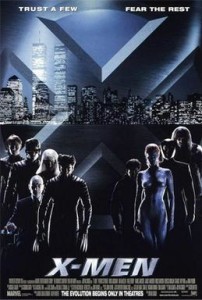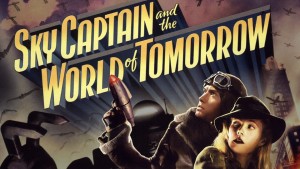 X-Men (2000) My first pick popped out right at the start of the decade, Byran Singer’s superhero film, X-Men. Awash in superhero movies it can be hard for a modern viewer to appreciate just what a groundbreaking movie this was. Before X-Men superhero movies always operated in a world of camp and with winks towards the camera letting the audience know not to take the subject too seriously. And while films like Superman: The Movie and Tim Burton’s Batman made big box office, they remained in that slightly campy quarantine. X-Men, from it’s gritty start amid the Holocaust through it’s epic finale grounded itself in realism, treating the subject and inviting the audience to treat the subject, seriously. These were real characters with real motivation talking about real human conditions, but using the fantastic as their vehicle. Without this movie both in its style and in its success, it is unlikely we would be in our current riches with both the Marvel and DC cinematic Universes.
X-Men (2000) My first pick popped out right at the start of the decade, Byran Singer’s superhero film, X-Men. Awash in superhero movies it can be hard for a modern viewer to appreciate just what a groundbreaking movie this was. Before X-Men superhero movies always operated in a world of camp and with winks towards the camera letting the audience know not to take the subject too seriously. And while films like Superman: The Movie and Tim Burton’s Batman made big box office, they remained in that slightly campy quarantine. X-Men, from it’s gritty start amid the Holocaust through it’s epic finale grounded itself in realism, treating the subject and inviting the audience to treat the subject, seriously. These were real characters with real motivation talking about real human conditions, but using the fantastic as their vehicle. Without this movie both in its style and in its success, it is unlikely we would be in our current riches with both the Marvel and DC cinematic Universes.
 Sky Captain and the World of Tomorrow. (2004) Set in an alternate history where Zepplin travel remained popular and pulp heroes battled mad scientists Sky Captain was a wild ride that never quite found success at the box office, but like another of my picks, Blade Runner, its influence it outsized to its ticket sales. This film pioneered for feature films the wide scale use of virtual sets. Of course Lucas was doing this already with his Star Wars prequel movies, but I do not think Lucas, with his endless piles of cash and reputation for being a technophile, produced the impact that Sky Captain did. By making this film with a modest budget, Kerry Conran illustrated that these techniques were available to all sorts of production that did not have ILM behind them. It also did not hurt that Conran shot Sky Captain with flair and style, making a film that had a distinct look over the flat perfect seen in Lucas’ Star Wars prequels.
Sky Captain and the World of Tomorrow. (2004) Set in an alternate history where Zepplin travel remained popular and pulp heroes battled mad scientists Sky Captain was a wild ride that never quite found success at the box office, but like another of my picks, Blade Runner, its influence it outsized to its ticket sales. This film pioneered for feature films the wide scale use of virtual sets. Of course Lucas was doing this already with his Star Wars prequel movies, but I do not think Lucas, with his endless piles of cash and reputation for being a technophile, produced the impact that Sky Captain did. By making this film with a modest budget, Kerry Conran illustrated that these techniques were available to all sorts of production that did not have ILM behind them. It also did not hurt that Conran shot Sky Captain with flair and style, making a film that had a distinct look over the flat perfect seen in Lucas’ Star Wars prequels.
